[Vientiane, 8/7/23]
On my last morning in Vientiane, I left my room just after 5AM, so earlier than usual, to see that neighborhood one last time. Of course, I might just return there, soon enough even, so it may not have been for the “last time.” Still, we can’t assume we’ll see anything again, not during this great misadventure we didn’t sign up for.
They decide, execute, coerce and punish. We obey, mostly.
In his Covid-19: The Great Reset, Klaus Schwab prophesized, or, more accurately, threatened us, “At the time of writing (June 2020), the pandemic continues to worsen globally. Many of us are pondering when things will return to normal. The short response is: never. Nothing will ever return to the ‘broken’ sense of normalcy that prevailed prior to the crisis because the coronavirus pandemic marks a fundamental inflection point in our global trajectory.”
Wandering before sunrise, I passed a noodle stand I had sampled 3 1/2 years earlier. Though mediocre, it was packed with hungry, ghostlike figures, slurping in the dark.
On Rue Samsenthai, I paused to view, again, a temple to Tran Hung Dao. Vietnam’s greatest military hero, he defeated the Mongols twice in the 13th century, so is considered a deity. Even in a foreign capital, he’s worshipped by uprooted Vietnamese 723 years after his death, which can only mean Viets are that grounded. That’s how you survive.
Again, I was amused by posters advertising “classical guitar courses” using a “new guitar notation” devised by one Hongkad Souvannavong. To affirm his genius, Mr. Souvannavong had himself depicted next to a portrait of Tchaikovsky. Like all men, he had grossly overestimated himself. On a planet overflowing with idiots and cowards, no one has actually met a self-aware one.
[Vientiane, 8/7/23]
I passed the corner where, in January of 2020, I had found a 34-year-old Norwegian, Thom, passed out after a night of drinking, his large bottle of Beerlao upright by his rear end. Living off a disability pension of $1,600 a month, plus whatever he made gaming online, Thom was having a grand time. In any American city, though, his pockets would have been emptied.
Back at Mixok Guesthouse, I took a photo of its entrance. Twenty-seven days I spent there, plus six days in 2020, in the same room even. Neglecting to buy mosquito repellent incense coils until it was nearly time to leave, I lost enough blood in that cheap room.
Vientiane’s bus stations are very far from downtown. There are many cities where the airport is closer. A saner person would have flown, but I liked to be on the ground, for the views. Going 343 miles, I was paying just $17, which included a car ride from my guesthouse. Past the pickup time, I was informed a sitting bus was no longer available, so I had to pay $2.58 extra for a sleeping bus. Whatever. I paid.
In the car, the driver switched to an English language station, so I was subjected to nonstop schlock I could understand. A billboard for a Chinese motorbike had this weird pitch, “I drive too fast to worry about cholesterol.” It’s lifted from some stupid T-shirt. Che’s cool face appeared on a shop sign. Having no idea what he did or stood for, his superficial admirers have made him immortal. Che will outlast JFK or Lincoln.
On the bus, I claimed the very last upper berth, which meant I had a view, sort of, though a cracked, much taped window. Those in lower berths curled up in darkness. With rain coming down, I felt underwater.
My 12 hours in transit would turn into nearly 18, on the worst road imaginable. This same highway in 2020 was not nearly as horrible, I remembered. Constanly jolted, jarred, shaken or swayed, I would disembark in the middle of the night on an unfamiliar stretch, with a headache that would intensify for more than a day. Luckily, there was a Vietnamese beef udon joint where I could wait 1 1/2 hour for the first tuk-tuk.
Clueless to what’s head as my trip began, I spread out with satisfaction my fancy purchases from Vientiane, all bought at Café Vanille. All reasonably priced, they were pork paté, chicken liver terrine, rabbit terrine, duck terrine, gouda from Holland, brie from Bréton and, most promisingly, lomo, a pork loin salumi, from Spain. The lomo and most of the brie I would eat onboard for lunch and dinner.
In 2020, I was on Lao bus so packed, half a dozen sat in semi darkness in the luggage compartment, but everyone was cheerful, and this time, too, people laughed and bantered, or they tried to sleep. What was there to do but endure? Even a one-year-old never cried through the endless turbulence.
[Vieng Kham, 1/4/20]
When I was bounced so hard, my head nearly hit the ceiling, a middle aged woman and an 11-year-old girl broke out laughing, and I had to laugh with them, for it was hilarious.
That girl had climbed onto my berth. Before her, a young man shared my space. I had no idea what my ticket entitled me to, exactly, but it would have been rude to point either to the luggage compartment. Making faces at her cellphone, the girl was making selfie videos, apparently.
My first day back in Pakse, I went to immigration to get a 30-day visa extension. Other than that, I did hardly anything. So exhausted, I skipped lunch and ate just a morsel of brie for dinner.
This morning, I opened my window to see, again, that old lady whose daily orbit spans less than ten yards. Glancing up, she noticed me. For breakfast, I had bánh cuốn, again, at my usual spot for 10,000 kips [52 cents]. Across the street was that well-fed orange dog in his dog shirt. He’s better loved than most children, I couldn’t help but think.
At the cafe next door, I had black coffee instead of with condensed milk. It cost 36 cents. Unsweetened, its impurity was too naked. It tasted vile. From behind the counter, a Buddhist chant softly played.
The owner of Jasmin showed up with his five-year-old daughter. Eating an orange treat that looked like some dried fruit, she proudly showed it to a man, then leaned against a woman who fixed her pony tail. When she sat too close to the corner of a table, this woman shifted her chair, to remove her from possible danger. After she had washed her hands at a bucket, the man got some toilet paper for her to dry herself.
Half Indian and fed on lots of Indian food, her dad is chubbier than most Laos. Still, he’s a native of Pakse, and will likely die here.
Just passing through, I make a feeble show of being at home. As for where I’ll die, what does it matter? A refugee as a child, I’m still a transient, but it’s also a question of temperament. My younger brother is rooted to San Jose.
Often looking at graves, I’m intrigued by those who died where they weren’t supposed to, whatever that means. In Vientiane, I stumbled upon Henri Entiene Pricco. Born in Marseilles in 1910, he died in Vientiane in 1966.
Sent to fight all over, Americans are killed in the most unlikely places. Before last week, how many knew there were 1,100 American soldiers in Niger? How many will die there?
During the Vietnam War, the NVA and Viet Cong expected to kill more Americans as they tried to retrieve their deads immediately after a battle. Honoring the dead, more died. This tradition, though, reassures the living they won’t be abandoned, even as chewed up corpses, soon to be bones.
It’s not done for the dead, but us living. No matter how seemingly futile or irrational, sense and dignity must be extracted from all human activities, from hellish bus rides to massive deaths under preposterous pretexts.
It’s beautiful when a child is tended to by non-relatives. Only the worst psychos need to dictate everyone. Even if broken, organic normality is preferable to any universal template. Aren’t you nauseated by what we’ve been subjected to?
No man is equally at home in two places, much less everywhere. I returned to Pakse because it’s a haven. After a turbulent ride, I need to calm down, and see a few smiling, familiar faces.
Seeing me again after nearly two months, the manager of Lankham, Thảo, remarked I seemed to have lost weight. Of course, I have. I’m lucky I didn’t lose more.
Her name means grass. Her husband’s, Sơn, means mountain. Salt of Pakse, they work all day, each day, to give their children the best education, for they still believe in the future, and their control over their destinies.
Reed thin, Thảo doesn’t need to lose weight. She’s full.
In this low key city of an overlooked country, it’s easier to believe the world hasn’t changed. If only you were so lucky.
[Pakse, 8/9/23]
[Pakse, 8/9/23]
[Pakse, 8/9/23]



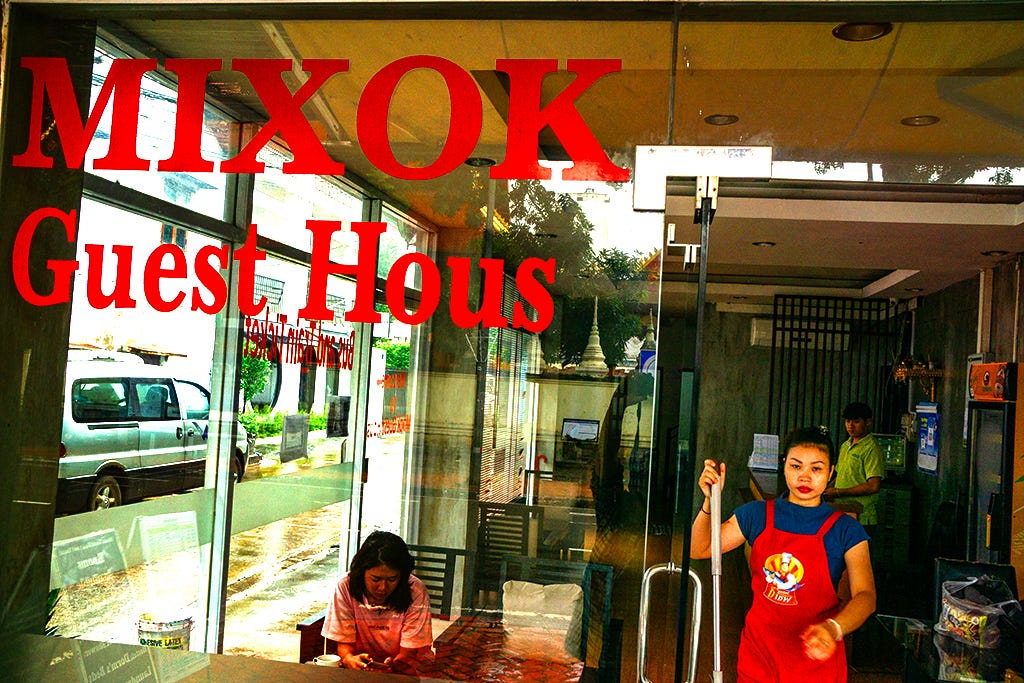

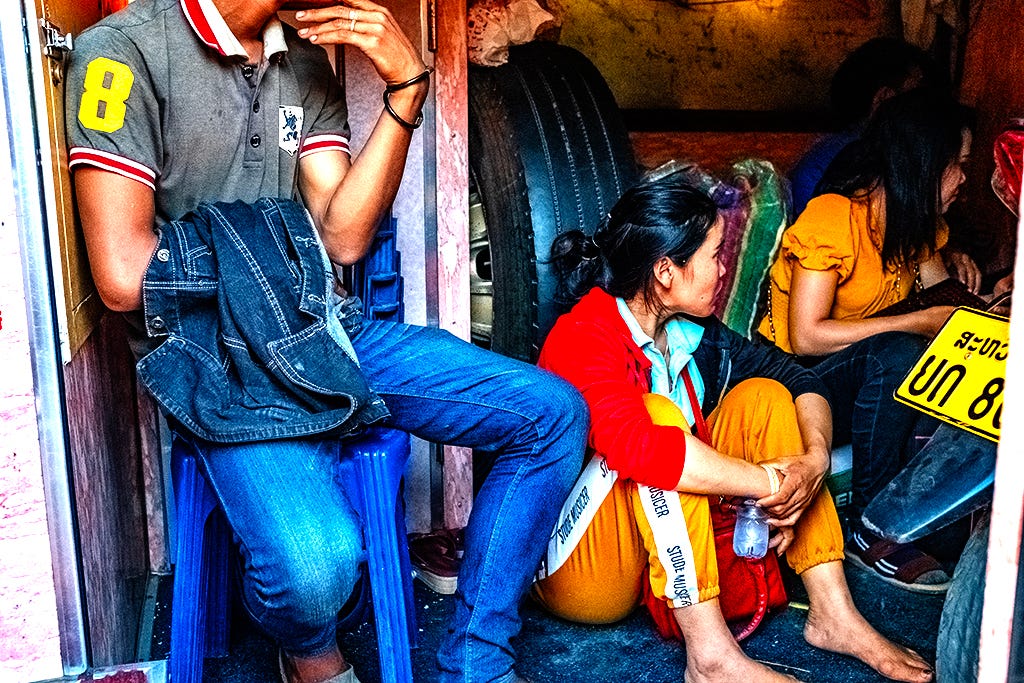
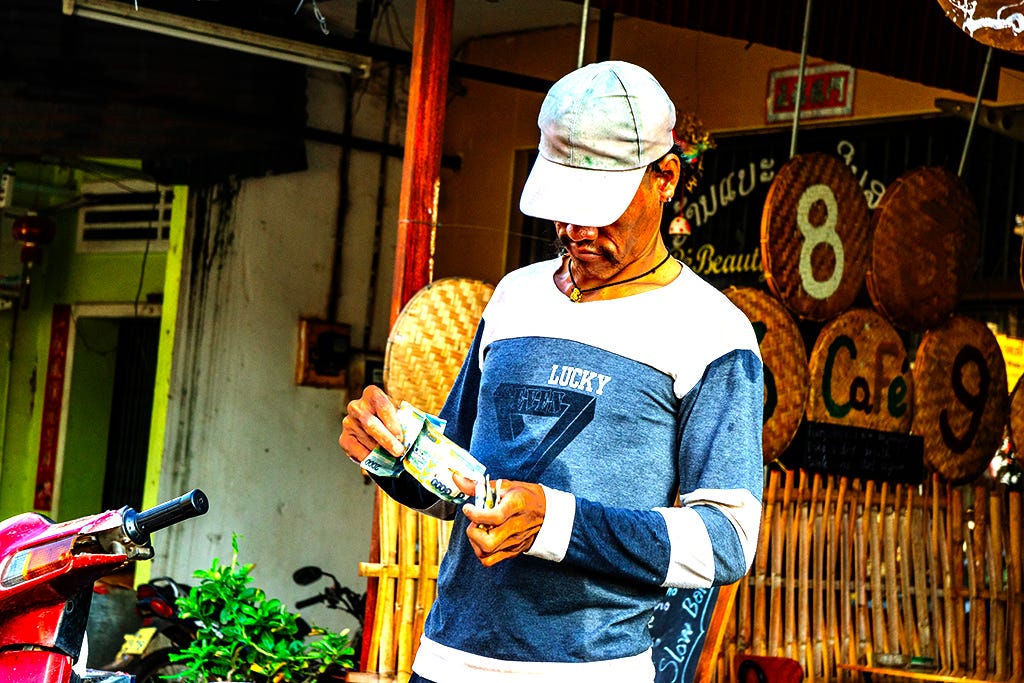
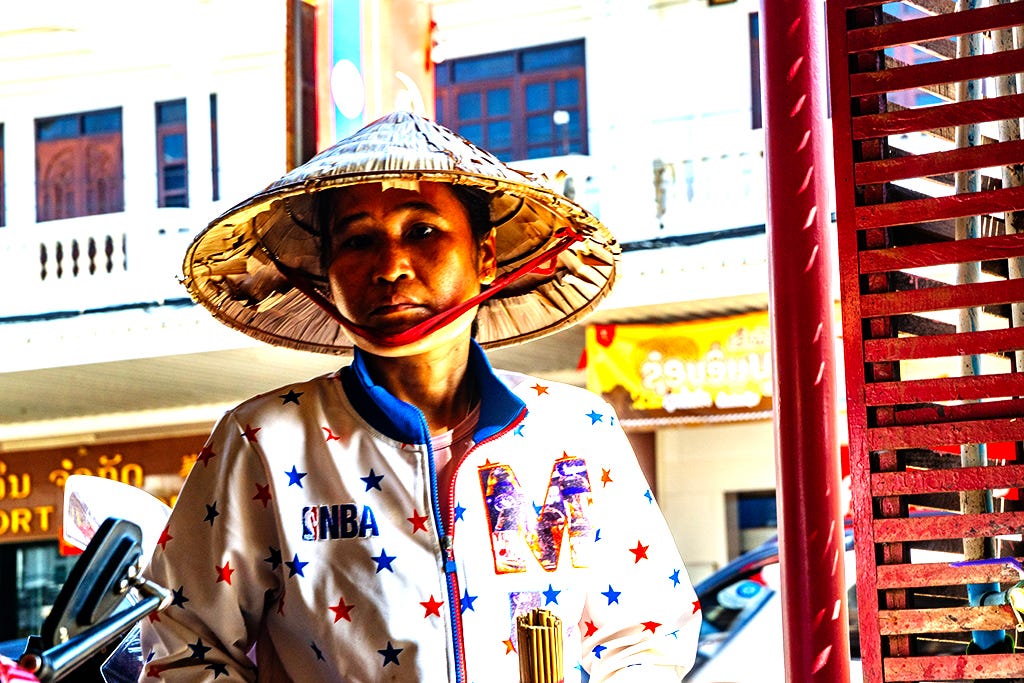
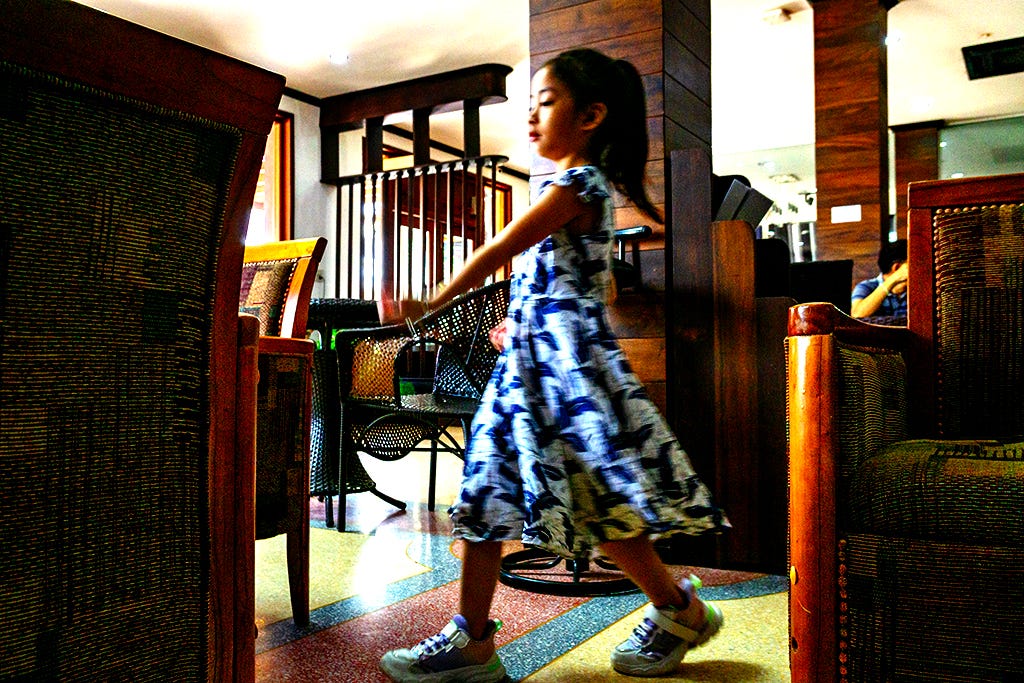
Hi everyone,
Regarding Laos' bad roads, my Canadian friend who has spent decades in this country writes:
"More than 30 years international development assistance. There are 3 modern travel modes in Lao – air, high speed train, Vientiane Vang Vieng highway. That’s it.
"Roads are substandard everywhere with poor engineering and even worse construction. The jolting ride was navigating the potholes on Lao national highway. Potholes arise from poor compaction, substandard materials and no enforcement of load limits on heavy trucks chewing up the pavement. I could go on.
To be fair, Pakse is in the far south. You could have stopped a day or two in Thakek which is a nice little town too.
"Transportation – most lao are still grateful they don’t have to walk. Many can remember there were no paved roads and few unpaved roads 30 years ago. A bus was a truck chassis, usually Russian military, with a wooden frame and seats crammed with chickens and baskets of vegetables, hurtling down the laterite tracks ..."
Linh
"I [too] like to be on the ground for the views."
I moved to Ensenada, Baja Norte, Mexico a little over three years ago. Foolishly I insisted upon taking the Greyhound south from Sacramento, California, to see the country side, I thought. I endured about 12 hours of tens of thousands of fast food signs passing by in the night on the interstate. Then arriving in San Diego and passing through one of the world's largest homeless encampments of the ubiquitous, drab blue tarps indicating the losers in the great American Dream con game I crossed through customs and boarded the much newer, cleaner Mexican ABC buses for the coastal route south. How I longed for the drabness of American interstates as the ABC bus careened down mountain cliff roads with the gloomy gray Pacific Ocean off to my right, about 50 stories down and Sonora desert Cacti on ragged hills to my left!
A better "ground view" was the Amtrak train ride from Sacramento to Seattle some years earlier. The Cascade mountains have not yet been "Americanized" with Arby's and Outback Steak houses.